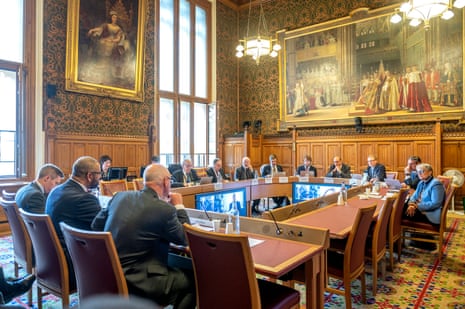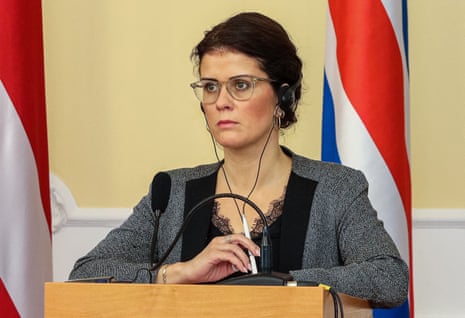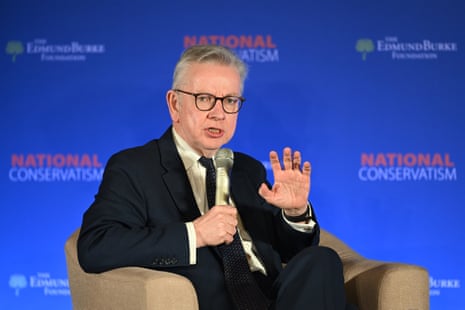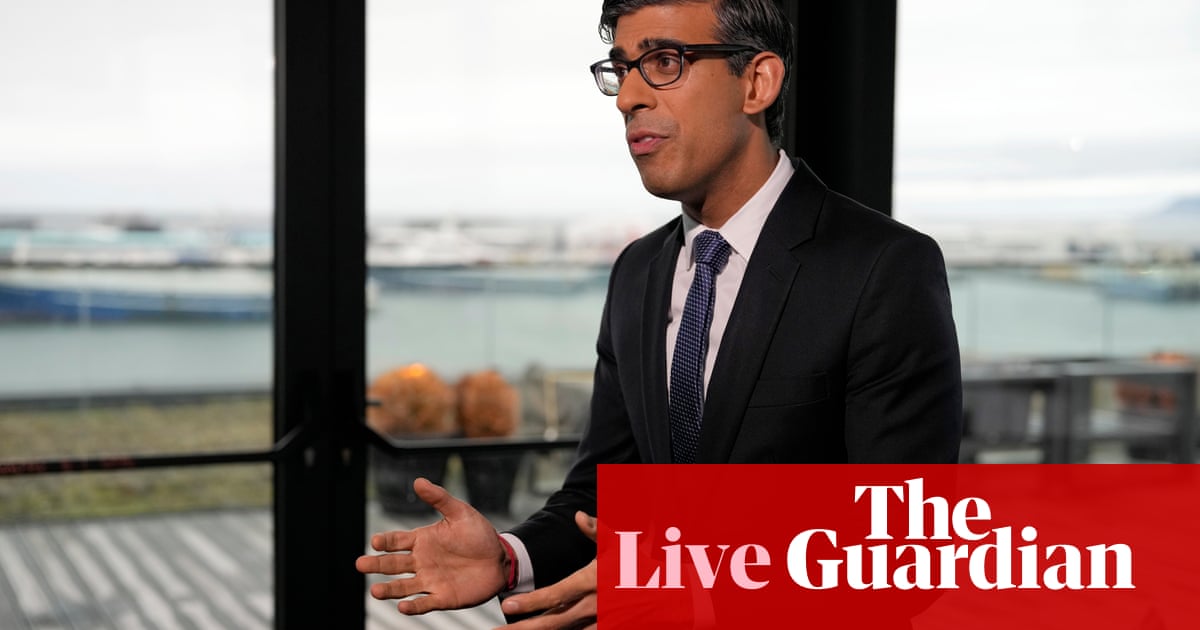Rishi Sunak’s hopes of using this week’s summit in Iceland to pave the way for change to the European court of human rights’ power to block migrant deportation flights from Britain to Rwanda will get a cold reception, a European politician who will meet him there has warned.
Tiny Kox, the Dutch senator who is president of the Council of Europe’s parliamentary assembly, told the Guardian that Britain could end up like Russia and face exclusion if it chose to ignore obligations to abide by the Strasbourg-based court.
Sunak, who is in Iceland for the first Council of Europe summit in 15 years, is to call for a reform of the ECHR’s rule 39, which was used to issue last-minute injunctions to ground the flights of migrants to Rwanda last year.
The government has said it is amending the illegal migration bill, which is currently going through parliament, to include a provision allowing the home secretary to ignore rule 39 injunctions.
But Kox told the Guardian:
I think the British government knows there is no opt-out of your European court of human rights, which has been signed and ratified decades ago and which has brought a lot of good things to Britain’s judicial system and the protection of its citizens.
We are not a cafeteria, where you can ask for the verdict of the court that suits you.
Suella Braverman, the home secretary, told a selected group of government-friendly papers during a visit to Rwanda earlier this year that she was “encouraged” by what she said were the UK government’s “constructive” talks with Strasbourg to overhaul court injunctions.
But, echoing the views of legal experts in Britain who have cast doubt on the UK’s claims of “possible reforms”, Kox suggested any move by Britain to back away from the treaty that established the court would “harm” British citizens. He said:
If London decided to leave the convention, it would be in the same situation as the Russian federation, which we had to exclude from our obligation because of its violations of international law.
-
Rishi Sunak has claimed that the UK is in a good position to persuade the European court of human rights to amend its procedures to make it easier for the UK government to implement its Rwanda policy for refugees. (See 5.21pm.) He was speaking in Iceland, as he arrived for a Council of Europe summit where he will push for changes, particularly to the ECHR’s rule 39 injunction process. But the Icelandic government, which is hosting the summit, has played down the prospect of Sunak getting the agreement he wants at the meeting. (See 3.39pm.) And the president of the Council of Europe’s parliamentary assembly has said the UK could end up like Russia if it just ignores court rulings, as the government wants to give itself the ability to do. (See 5.36pm.)

Rishi Sunak’s hopes of using this week’s summit in Iceland to pave the way for change to the European court of human rights’ power to block migrant deportation flights from Britain to Rwanda will get a cold reception, a European politician who will meet him there has warned.
Tiny Kox, the Dutch senator who is president of the Council of Europe’s parliamentary assembly, told the Guardian that Britain could end up like Russia and face exclusion if it chose to ignore obligations to abide by the Strasbourg-based court.
Sunak, who is in Iceland for the first Council of Europe summit in 15 years, is to call for a reform of the ECHR’s rule 39, which was used to issue last-minute injunctions to ground the flights of migrants to Rwanda last year.
The government has said it is amending the illegal migration bill, which is currently going through parliament, to include a provision allowing the home secretary to ignore rule 39 injunctions.
But Kox told the Guardian:
I think the British government knows there is no opt-out of your European court of human rights, which has been signed and ratified decades ago and which has brought a lot of good things to Britain’s judicial system and the protection of its citizens.
We are not a cafeteria, where you can ask for the verdict of the court that suits you.
Suella Braverman, the home secretary, told a selected group of government-friendly papers during a visit to Rwanda earlier this year that she was “encouraged” by what she said were the UK government’s “constructive” talks with Strasbourg to overhaul court injunctions.
But, echoing the views of legal experts in Britain who have cast doubt on the UK’s claims of “possible reforms”, Kox suggested any move by Britain to back away from the treaty that established the court would “harm” British citizens. He said:
If London decided to leave the convention, it would be in the same situation as the Russian federation, which we had to exclude from our obligation because of its violations of international law.
Rishi Sunak is in Iceland, where he has given an interview to broadcasters before the Council of Europe summit. The Icelandic government, which is hosting the summit, has played down the prospect of the UK achieving the change to the European court of human rights that it wants at the meeting. (See 3.39pm.) But when Sunak was asked if he was really likely to achieve change, which he says the UK needs so that it can implement its Rwanda policy for asylum seekers, the PM insisted it had persuaded the ECHR to make changes in the past.
He said the court itself is reviewing its rule 39 process – the mechanism that was used to halt a flight to Rwanda last year. UK ministers have been talking to the court about this, he said. He went on:
When it comes to the European court in particular, it was the UK that led reforms previously, something called the Brighton declaration, which meant that the process was changed previously. We’ll be building on that going forward. So, yes, we have a track record of seeing change happen …
One of my priorities for the country is to stop the boats. We’re going to do absolutely everything we can to do that. That’s about working with other countries. That’s why I’m here in Iceland.

“Not for EU” labelling on British food products sold across the UK will be phased in gradually from this autumn, James Cleverly, the foreign secretary, has told peers.
As PA Media reports, Cleverly told a Lords committee that during negotiations with retailers before the signing of the Windsor framework, UK-wide labelling was identified as the preferred option. The labelling requirement is part of the government’s deal with the EU to reduce checks on British products entering Northern Ireland.
Cleverly said that while autumn was the starting point for the plan, it would be phased in over a couple of years. He explained:
We have been talking about this for quite some time, including in the command paper in 2021, so this shouldn’t really be a surprise to the retail sector.
Of course they will want to have details about size and prominence and I will get details about exactly how and when.
It is not just a sudden start, we have been talking about this for a couple of years and it won’t be fully implemented for another couple of years.
I am not a retailer, I don’t want to imply simplicity when there might be complexity, but this is something we discussed extensively with the retail sector, including those who said that labelling would be a good way of ensuring their products would be available in GB, not just in Northern Ireland.

Suella Braverman’s speech at the NatCon conference yesterday got a positive write-up in some of the rightwing papers this morning. But the home secretary remains “deeply unpopular with the British public”, according to the polling firm, YouGov. It has sent out this summary of its latest findings.
New polling by YouGov reveals that home secretary, Suella Braverman, remains deeply unpopular with the British public as her net favourability score falls to -38, down from -35 at the start of last week.
Just 14% of Britons have a favourable view of Braverman, while half (52%) have an unfavourable view, giving her a net score of -38. Among those who voted Conservative in the 2019 general election, her net score is -14.
The prime minister, Rishi Sunak, also has a negative net favourability score among the general public. Three in 10 Brits (31%) have a favourable view of Sunak, while six in ten (59%) have an unfavourable view of him. This gives the prime minister a net score of -28, virtually unchanged from the -29 he scored last week (5-9 May).
The Labour leader, Keir Starmer, has a net favourability score of -16 among the public. This is up three points from 5-9 May when he scored -19.
Latest politician favourability figures (14-15 May)
Keir Starmer: 35% (+2 from 5-9 May)
Rishi Sunak: 31% (=)
Jeremy Hunt: 18% (+1)
Suella Braverman: 14% (-3)https://t.co/e1rcgxdxYO pic.twitter.com/5CkmP5UeF7— YouGov (@YouGov) May 16, 2023
Children are likely to be among those needing support through some of the most extreme effects of gambling addiction, a leading charity has told MPs looking into the government’s recently released gambling white paper.
Matthew Hickey, the chief executive of the Gordon Moody Association, which runs residential treatment programmes for adults with the most severe cases of gambling disorder, said his organisation would need to start looking into how it will also start to treat children.
He said they are among the “affected-others” harmed by their parents’ and guardians’ gambling addictions, telling the Commons culture committee:
That will never be a residential treatment pathway, it will be something during holidays, something during weekends.
What’s more important here though, is children as affected-others. A number of our clients will say that they have become an addict because they saw their parent as a gambling addict. It was learned behaviour because dad did it, dad went into the bookies. Or we went into the pub and, from the age of seven, I was allowed to go on the fruit machines in the pub.
He added:
Yes, we will see a lot of children affected by gaming and younger people gambling, but we’ll see even more as affected-others because of the effects that parents have had on them.
He spoke as NHS England published a survey suggesting nearly one in five people gambling online either have a problem or are at risk.
The first public survey carried out since start of the Covid pandemic shed light on the proportion of people aged 16 and over who are problem gamblers or engaging in risky gambling behaviour.
While a smaller proportion of people in the 16-34 age group had gambled in the past year (excluding lotteries) than people in older age brackets, the young were the most likely to bet online.
Liz Truss, the former Tory PM, has arrived in Taiwan, where she will be giving a speech tomorrow morning local time (or middle of the night UK time) showing support for the country in the face of the threat it faces from China. This is from the Taiwanese foreign affairs ministry.
Minister Wu warmly welcomed @trussliz following the former #UK🇬🇧 PM’s arrival in #Taiwan🇹🇼! Her continued support of our democracy & #TaiwanStrait stability is highly appreciated by the government & people. We look forward to stimulating dialogues with the MP over her 5-day stay. pic.twitter.com/qahT5x3LX7
— 外交部 Ministry of Foreign Affairs, ROC (Taiwan) 🇹🇼 (@MOFA_Taiwan) May 16, 2023
Perhaps surprisingly, considering the tough line the National Farmers’ Union has been taking on this government over labour and trade deal, Rishi Sunak’s food summit appears to have been somewhat of a success.
He faced a rather hostile room, amid post-Brexit agricultural worker shortages, sky-high input costs, profiteering supermarkets and trade deals undercutting British farmers.
However, Minette Batters, the president of the NFU, told the Guardian that she was quite pleased with how the day went, suggesting Sunak had U-turned on his previous policy agenda of prioritising trade deals. She said:
I think the prime minister set out a very different agenda on taking domestic food security seriously. We had some very constructive and focused breakout sessions, and on trade he’s happy to take a very tough line with Canada and Mexico.
It’s also good to see it in black and white that is not now, or ever, with hormone-treated beef or chlorine-washed chicken.
Martin Lines, chair of the Nature Friendly Farming Network, was at the summit. He said afterwards that although some of what was said about the future was positive, the government still needed to do more to address labour shortages now. He said:
They have committed to the same level of seasonal workers for next year, with a possible uplift looking forward, and also investment in automated picking technologies.
A lot of what we heard today …. [was] welcome, but there is little actual sorting out the issues within the supply chain and the problems we have with labour today.
We need a lot of [workers] to stay for nine months, not six months, and we would like repeat visits by the same people who we train up to be skilled. This is a good first step but we do need to focus on the short-term issues.

Conservatives need to recognise that elections are won on economics and public services rather than culture wars, Michael Gove has warned. Peter Walker has the story here.
Downing Street has said that Rishi Sunak will use the Council of Europe meeting in Iceland this evening to push for action to end “the humanitarian disaster caused by illegal migration”. In particular, Sunak will argue for reform to the European court of human rights’ rule 39 (see 10.08am), where No 10 says the court is “open” to change (see 1.43pm).
But Thordis Gylfadóttir, the Icelandic foreign minister, told Radio 4’s the World at One that the summit, which her government is hosting, would not be focusing much on immigration. She said:
This summit has not a big focus on that. The biggest focus is, of course, Ukraine, and then other issues such as AI and environment and other things. So this summit doesn’t have a big focus on migration in general.
She also said reform of rule 39 would not be agreed at the summit. She said:
The leaders are reconfirming their commitment to the common human rights protection system and in particular, the court is a cornerstone of our protection system.
But the next two days, the time we have we are not using to reform certain articles in the court.
Pressed on whether there would be discussions on Sunak’s call for changes to rule 39, she said:
I believe that there will be a discussion on it, but there will not be I think a real concrete outcome on reforming certain articles.

The i’s Paul Waugh has more from Michael Gove’s appearance at the NatCon conference.
Asked to list the key Conservative achievements of the past 13 years, @michaelgove says: Universal Credit, his school reform, vocational education, a creative economy, more diverse Parliament, science policy, Ukraine, levelling up…
Strangely no mention of Brexit?
— Paul Waugh (@paulwaugh) May 16, 2023
But here’s an admission from @michaelgove
“It is increasingly difficult to get on the properly ladder”.Narrator: Michael Gove is the Secretary of State for Housing.
— Paul Waugh (@paulwaugh) May 16, 2023
Gove added that the PM had asked him “explicitly” to “look at” the problems faced by first time buyers
— Paul Waugh (@paulwaugh) May 16, 2023
The government will not be renegotiating any parts of the Windsor framework despite the continuing protests by unionist groups, James Cleverly, the foreign secretary, has told a Lords committee.
In answer to a question by from the Ulster Unionist peer Lord Empey about the prospects of more talks, Cleverly replied said: “It’s a very simple answer [to] that one overall, which is ‘no’.”
Lord Dodds, the former DUP leader in the Commons, expressed anger that the government still had not published the list of EU laws that would apply in Northern Ireland even though they had relied on claims of a vast reduction to “whip up” support for the framework. He asked:
Why won’t you give us the list? Is is because you are afraid of the criticism that might be coming forth?
Cleverly replied there were “thousands of laws” that disapplied and he was very “proud” of the fact that they got the EU to recognise the starting point was “zero pages” of laws applying in NI. “Far from saying we are embarrassed, the opposite is true,” he said
Michael Gove, the levelling up secretary, has told the NatCon conference that he does not think figures out later this month will show net immigration reached 1 million last year.
A report last week quoted a thinktank forecast saying the figure could be between 650,000 and 997,000.
Asked about the 1 million figure, Gove said:
I don’t think it will reach those figures.
But you are right, if we are looking at pressure on housing, you need to look at it in the round. So, Britain has always been a country that has benefited from people of talent arriving here and people fleeing persecution.
The numbers recently have been at a level where there is an inevitable pressure on housing and on public services.
Gove also said a “critical part of Brexit” was being able to “say this is the level of migration we as a country believe is right” and establishing that “there is a limit”.

Michael Gove, the levelling up secretary, has been taking part in a Q&A at the NatCon conference. There is no live feed, but Peter Walker is there, and he has been tweeting.
It’s Gove time at NatCon. Rather than a speech, he’s being interviewed by the Telegraph’s Madeleine Grant, whose opening question – I précis slightly – is, ‘What’s a nice minister like you doing in a place like this?’ He waffles a touch in response. pic.twitter.com/PrbDrZ7Bu5
— Peter Walker (@peterwalker99) May 16, 2023
Michael Gove is, I think the phrase goes, talking around the subject in his answers. It’s his specialist talent of Political Just A Minute: talk for 45 mins with as much deviation and repetition as you want, but without creating any news at all.
— Peter Walker (@peterwalker99) May 16, 2023
Gove effectively confirms that his department will not get rid of leaseholds. Asked if this is the plan, he says the idea is to reduce leaseholds “to a homeopathic element in the UK property market”.
— Peter Walker (@peterwalker99) May 16, 2023
Madeleine Grant is trying to pin down Gove on the fact that, as she puts it, many younger people see Conservatism as a project dedicated to supporting older people. Gove goes into full Just A Minute obfuscation/deflection mode.
— Peter Walker (@peterwalker99) May 16, 2023
